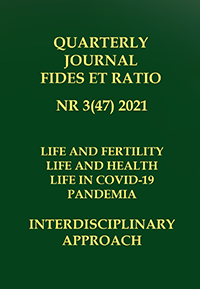Abstract
The problems of resocialization measures are not easy and complex. After all, the recipients of these interventions are the perpetrators of crime, including minor and juvenile offenders. In order for resocialization to be effective, it must follow the right principles. The basic principle is the principle of support. Support should have many aspects: material, social, pedagogical, psychological, and medical. The support provided to inmates or juveniles from youth detention centers should include two elements. Those working in resocialization institutions must be willing to provide support despite the fact that the recipients are offenders. There must also be a willingness on the part of the recipients to accept the support. Offenders are reluctant to open up to social support as it requires acknowledging their weakness and even admitting to their actions. They prefer to show their strong-mindedness because it gives them a sense of security. When providing the support, the individual characteristics of its recipients should be taken into account, including personality traits, life experiences, psychological trauma, interpersonal conflicts, illnesses, and family and vocational situation. The perpetrators of criminal acts are often characterized by social maladjustment, antisocial personality, and even criminal lifestyles, which causes their reluctance towards resocialization measures and change in the broad sense. Specific offences are those against health and life. The introduction of a psychological construct called biophilic character into the resocialization measures seems to be desirable and useful. Character in general is an important element in the structure of personality. According to E. Fromm, biophilia is the love of life, respect for one's own life and the life of others, and respect for the world of animals and plants. As the biophilic character develops, the level of aggressiveness should decrease and the frequency of aggressive behaviour should decline. As a method in psychological research, observation allows for noting pro-life, or biophilic, responses in inmates and juveniles from youth detention centres. The greater the number of such responses, the greater the chance of the development of biophilic tendencies and even biophilic character, which will translate into the effectiveness of resocialization.
References
Ciccarelli, S.K., White, J.N. (2015). Psychologia, Poznań: Dom Wydawniczy REBIS.
Farnicka, M., Liberska, H., Niewiedział, D. (2016). Psychologia agresji. Wybrane problemy, Warszawa: Wydawnictwo Naukowe PWN.
Fromm, E. (1999). Anatomia ludzkiej destrukcyjności, Poznań: Dom Wydawniczy REBIS. Gruźlewska, J. (2016). Powstanie i rozwój instytucji więziennej, (w:) M. Ciosek, B. Pastwa-
Wojciechowska (red.), Psychologia penitencjarna, 83–110, Warszawa: Wydawnictwo Naukowe PWN.
Jaworska, A. (2016). Teoretyczne podstawy procesu resocjalizacji, (w:) M. Ciosek, B. Pastwa- Wojciechowska (red.), Psychologia penitencjarna, 111–143, Warszawa: Wydawnictwo Naukowe PWN.
Kodeks karny wykonawczy (2009), (w:) M. Buczna (red.), Kodeks karny. Kodeks postępowania karnego. Kodeks karny wykonawczy. Kodeks wykroczeń. Kodeks postępowania w sprawach o wykroczenia. Kodeks karny skarbowy. Ustawa o opłatach w sprawach karnych. Ustawa o postępowaniu w sprawach nieletnich, 479–614, Warszawa: Wolters Kluwer Polska.
Krzemionka, D. (red.) (2017). Słownik pojęć psychologicznych do wykorzystania w rozmowach z partnerem, szefem, przyjacielem, a nawet wrogiem, Kielce: Wydawnictwo Charaktery.
Majchrzyk, Z. (2018). Psychologia sądowa dorosłych (1976–2016). Teoria i praktyka, Warszawa: Oficyna Wydawniczo-Poligraficzna ADAM.
Majchrzyk, Z. (2020). Koryfeusze i choreuci psychiatrii i psychologii sądowej PTP (1920-2020), Warszawa: Oficyna Wydawniczo-Poligraficzna ADAM.
Marzec, A., Sarzała, D., Woźniak, W. (2018). Profilaktyka społeczna i resocjalizacja w kontekście psychologicznym, Warszawa: Ośrodek Wydawniczo-Poligraficzny „SIM”.
Pospiszyl, K. (2000). Psychopatia, Warszawa: Wydawnictwo Akademickie „Żak”. Siek, S. (1986). Struktura osobowości, Warszawa: Akademia Teologii Katolickiej.
Wawrzyniak, M. (2020). Profilaktyka autoagresji w warunkach izolacji penitencjarnej, (w:) W. Woźniak (red.), Wokół higieny psychicznej i zdrowia psychicznego, 89–100, Warszawa: Polskie Towarzystwo Higieny Psychicznej & Ośrodek Wydawniczo- Poligraficzny „SIM”.
Woźniak, W. (2015). Readaptacja sprawców zabójstw ze szczególnym okrucieństwem. W kierunku formowania paradygmatu pracy socjalnej w oddziaływaniu penitencjarnym, Ružomberok: Verbum – vydavatel’stvo Katolíckej univerzity v Ružomberku.
Woźniak, W. (2019). Czynniki sprawcze zaburzonej komunikacji wśród więźniów, Kwartalnik Naukowy Fides et Ratio, 38(2), 395–402, https://doi.org/10.34766/fetr.v2i38.87
Woźniak, W. (2020). Relacja pomiędzy psychologią a pracą socjalną, Kutno: Wydawnictwo WSGK.
Woźniak, W., Ptak, K. (2005). Resocjalizacja w zakładzie poprawczym i schronisku dla nieletnich, (w:) W. Woźniak (red.), Przestępca i skazany nie tracą godności osoby, 183– 200, Olecko: Wydawnictwo Wszechnicy Mazurskiej – Acta Universitatis Masuriensis.
Zabłocki, K.J., Woźniak, W. (2017). Wsparcie społeczne i jego rola w resocjalizacji, (w:) W. Woźniak (red.), Wokół destrukcji i zapobiegania. Począwszy od holocaustu narodu asyryjskiego, 125–138, Łódź: Wydawnictwo Uczelni Nauk Społecznych.

